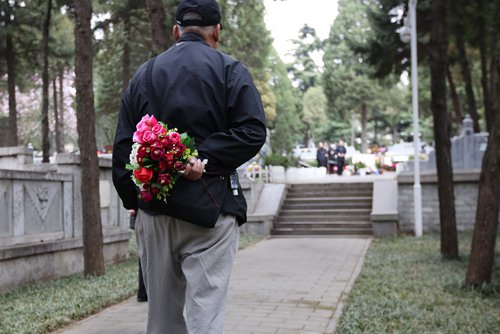
Beijing's Babaoshan Cemetery holds an activity in April aiming to raise public awareness of eco-friendly funeral options. (Photo: VCG)
Chinese internet startups are pouring money to the funeral industry, which is beginning to change the "taboo" industry with open discussions and transparent pricing.
The website mudi.yiko.org offers one-package funeral and interment services for customers.
It allows customers to browse cemeteries online by location, comparing prices and pictures showing how they look. The site also allows people to compare traditional burials, cremations, and more ecologically friendly options.
Environmentally friendly burials not only bring down the costs for families of the deceased but also use less land in crowded cities.
Most people who buy online funeral services are in there 30s and 40s, helping their older relatives deal with the loss of family members, Ma Lei, founder and CEO of mudi.yiko.org, told the Global Times.
People this age keep an open mind toward internet services and can accept new ways of doing things, according to Ma.
Ma's website gathers information about all the options available in one place, and lists the prices clearly, unlike traditional businesses offering funeral services, which tend to charge exorbitant prices depending on who their customers are.
Funerals are a taboo topic for most Chinese people, and most do not make preparations before their deaths. This creates a space for traditional businesses to gouge customers in the confusion of their grief.
Ma believes that the online business will create a standard for the whole industry, preventing exorbitant prices on funeral products and offering better services.
However, the online businesses so far have not brought a total shift to the traditional funeral industry. Rather, like Ma's, they are serving as an information aggregation platform, analysts reached by the Global Times noted.
State controlled
In China, most cemetery and funeral organizations are run by public institutions affiliated with the Ministry of Civil Affairs, with little private investment involved, Zhao Ping, a researcher from the Academy of the China Council for the Promotion of International Trade, told the Global Times.
The price of urns starts from 100 yuan with no upper limit. But if customers purchase one from a funeral parlor or a mortuary, the prices will be much higher. State-owned institutions have to earn profit from services such as selling urns since the price of a cremation service is highly regulated, the Beijing News reported, citing insiders.
Government officials understand that the quality of urns can vary based on the wealth of a family, so these prices are not heavily regulated, Li Bo, an official in charge of funerals from the Ministry of Civil Affairs told the China Youth Daily.
Market distortions
Traditional notions of propriety, pride and competition over the scale and cost of funerals can distort the industry, Li said.
Death is becoming an expensive proposition as the price of land for tombs is almost keeping pace with that for houses, reports Xinhua News Agency.
The price of a tomb in a Shanghai cemetery is as high as 300,000 yuan ($44,000), and the average is more than 60,000 yuan. In Beijing, the price of a tomb is around 150,000 yuan, according to a 2017 report from China National Radio.
Chinese traditionally believe that souls only rest in peace if their bodies are covered by soil, and the practice is also widely considered more respectful to the deceased. However, the government is moving to discourage burials and promote cremation.
Zhao explained that one reason the overpricing of the funeral products could not be restrained over the years is official documents on regulating the market price of the funeral industry, including cemeteries, are quite vague, and not mandatory.
Analysts say entrepreneurs need to shake up the industry monopolized by the government, challenging traditional notions and making the industry more transparent, ecologically friendly and and fairly priced.


